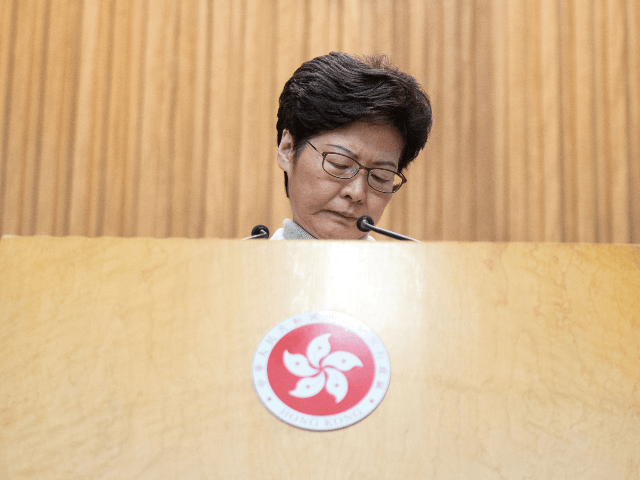Hong Kong Chief Executive Carrie Lam told reporters on Tuesday that she met with the losing pro-communist candidates in November’s District Council elections to apologize for their defeat and that it was “natural” for her to do so.
The Hong Kong protest movement galvanized millions of voters in late November for over 400 contested seats in the city’s district councils, which govern locally. Voters overwhelmingly rejected pro-China candidates, leaving only one of 18 district councils run by establishment figures and defying Beijing’s repeated allegations that pro-democracy protesters were a loud minority in the city that most residents objected to.
The people of Hong Kong directly elect the members of their district councils, but not most of the seats in the Legislative Council, which writes laws citywide. Those seats go to designated politicians chosen by special interest groups close to Beijing, so the people do not have a chance to contest the establishment for them, making the District Council election the only way for the public to make their grievances heard on the ballot.
A local newspaper reportedly revealed that Lam had met with several of the defeated district councillors, though it did not name them other than identifying them as part of the pro-China lobby. Lam did not deny the meeting, and told reporters she had apologized to losing candidates because her unpopularity clearly affected their chances of winning. Lam is the least popular chief executive in the city’s history.
“The loss of the pro-establishment camp in the District Council election was undeniably linked to the government,” she said. “I think it is natural for me to apologize to pro-establishment camp District Council election candidates.”
Lam also vowed to respect the newly elected members of the District Councils swept into power by the city’s disdain for her leadership, denying that her government would keep funding out of those councils to advance their anti-establishment agendas.
Pro-democracy candidates won 347 of the city’s 452 District Council seats in an election with record turnout, establishing a mandate for leaders of the protest movement to take action towards the reforms the protest movement has demanded. Protesters first took the streets in June in response to a proposed bill in the Legislative Council that would have allowed China to extradite anyone present in Hong Kong, regardless of their residential status, if the Communist Party deems them a criminal. China’s notoriously repressive prison system often arbitrarily arrests, tortures, and “disappears” political dissidents.
Lam ultimately submitted to the demand to eliminate the extradition bill in September. By then, though, the protesters had made five demands, including the extradition bill withdrawal: an end to officials referring to peaceful protests as “riots,” an independent investigation into the rampant police brutality committed against protesters, freedom for political prisoners, and direct election of members of the Legislative Council, not just the District Councils.
Lam reiterated on Tuesday that she would not cede to any of the four remaining demands.
The Global Times, China’s leading government propaganda newspaper in English, applauded Lam’s remarks and interpreted them as meaning that the pro-communist politicians were not expelled from their seats because the public did not approve of their positions, but as an act of revenge against Lam – in other words, the Global Times implied that Lam, not the Chinese communist agenda, is what has truly become unpopular in Hong Kong.
Lam also took the opportunity of the press conference to condemn pro-democracy student activists, noting that police had arrested over 2,000 students since the protest movement took off in June.
Lam is expected back in Beijing on December 14, after being invited in early October for a parade celebrating dictator Xi Jinping during the 70th anniversary of the Communist Party takeover of the country. The Hong Kong government announced her visit shortly after newly minted police commissioner Chris Tang returned from the communist capital to receive instructions from the regime on how to suppress the protests.
Following Tang’s visit to Beijing, police allowed one of the first uninterrupted peaceful marches in the city since the summer, which attracted 800,000 people and transpired without any significant violence. Organizers from the group the Civil Human Rights Front said the protest the week before was significantly smaller, attracting nearly 400,000 people before police shut it down violently despite the group having received a permit for it. Both protests were much larger than the ones preceding it, representing the growth in momentum for the pro-democracy movement since President Donald Trump signed the Hong Kong Human Rights and Democracy Act on Thanksgiving Day.

COMMENTS
Please let us know if you're having issues with commenting.